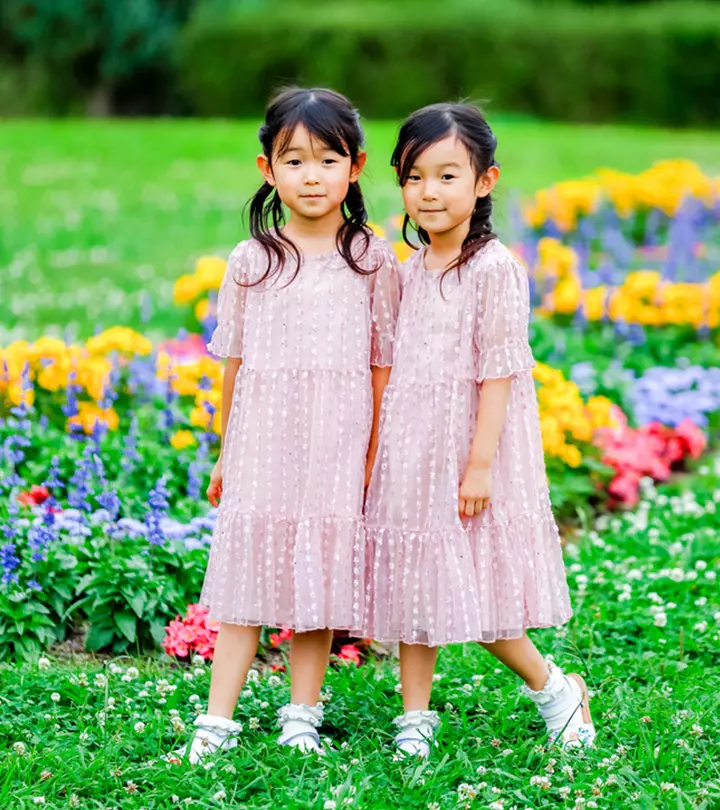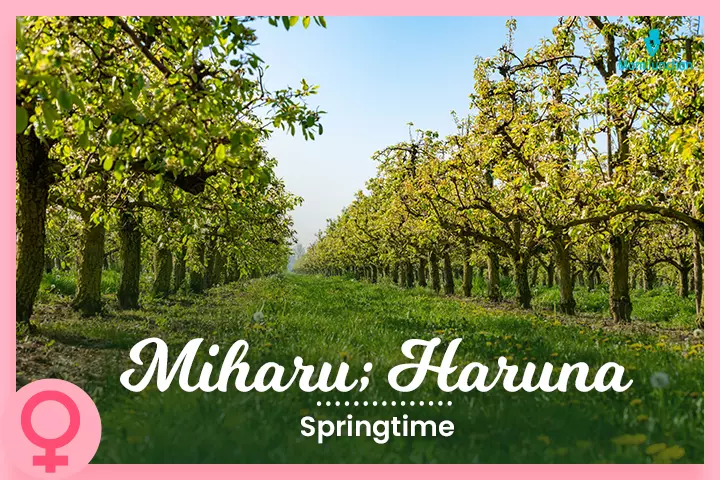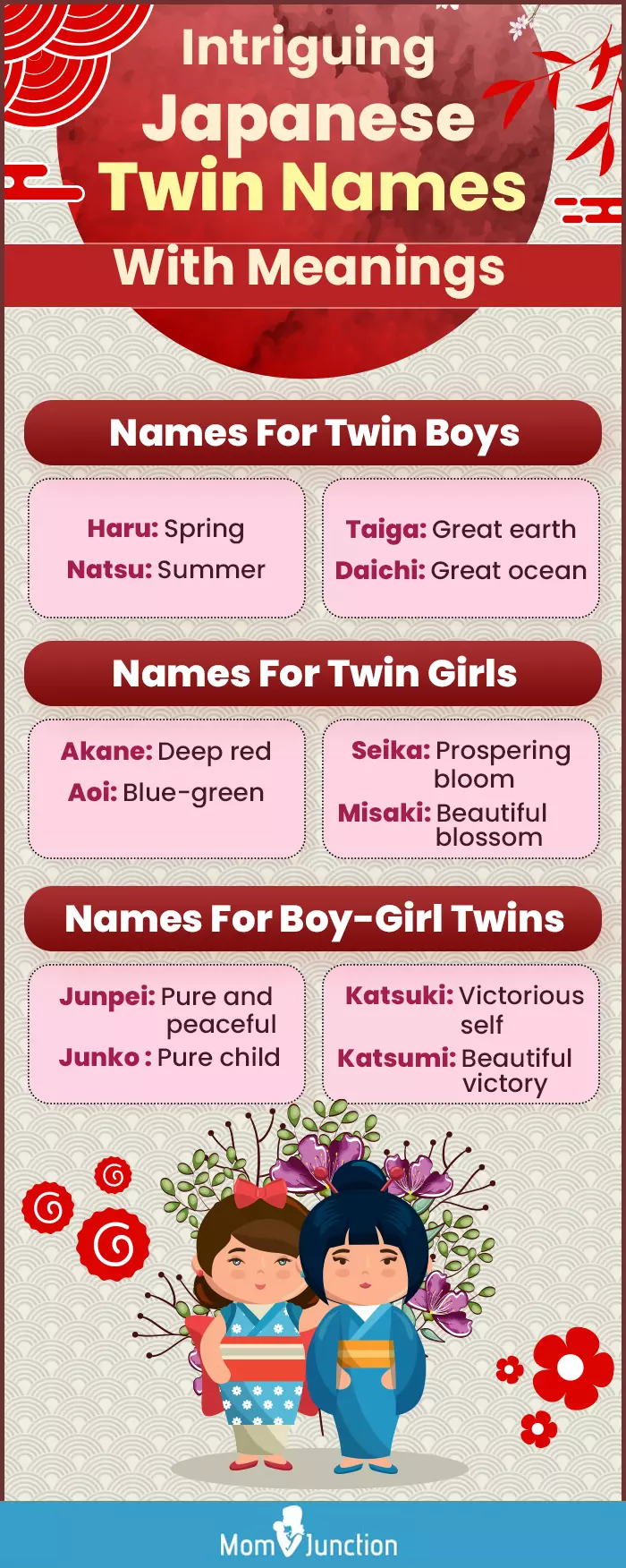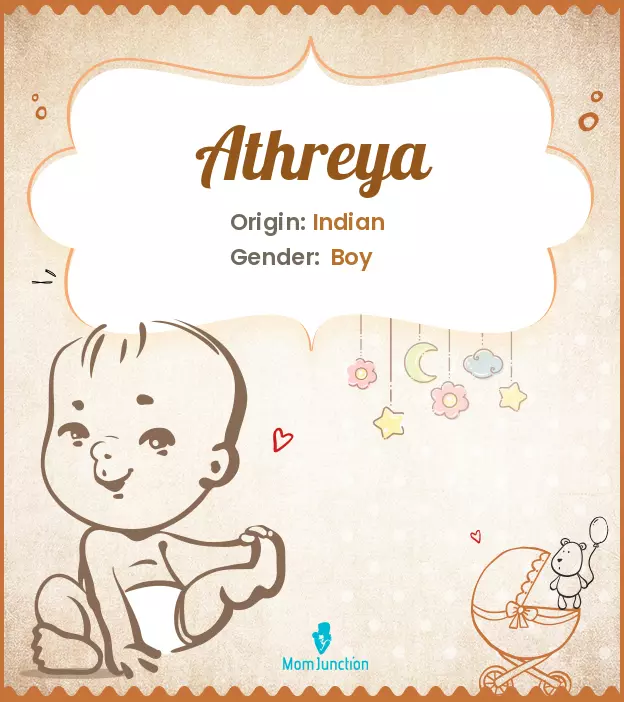
Image: Shutterstock
Japanese names are some of the most versatile, widely varying in phonetics and meanings. They are predominantly composed of kanji characters, whose pronunciations and interpretations change based on how they are written or arranged. When choosing Japanese twin names, you can choose a pair with complementary meanings or similar sounds.
Naming conventions in Japan make it easy for new parents to choose Japanese names for twins, regardless of gender. For instance, masculine names often end in -ro, (meaning ‘son’ or ‘bright’), -ta (‘great’ or ‘first son’), and -o (‘man’). Similarly, Japanese feminine names often end in -ko (meaning ‘child’), -mi (‘beauty’), and -ka (‘scent’ or ‘flower’). These common suffixes are handy when choosing twin Japanese names, as they can help create a pattern even when the names’ connotations are miles apart. To help you further, the following list covers some of the most beautiful, powerful, and meaningful names for Japanese twins.
Key Pointers
- Japanese naming conventions are known for their versatile phonetics and meanings.
- Japanese twin names often have similar rhyming patterns, complementary meanings, or identical characters.
- These names can be inspired by various elements, such as nature, colors, human virtues, and even fictional characters.
300+ Japanese Twin Names With Meanings
Japanese twin boy and girl names come in innumerable varieties, from short to long, complicated to simple, and unique to popular. They may be inspired by nature, human virtues, and even fictional characters.
Japanese Twin Boy Names (Boy – Boy)
Japanese twin baby boy names usually reflect characteristics like leadership, strength, and wisdom, and often, their birth order. We bring you some complementary twin names here.
1. Akihiro and Akihiko
Akihiro combines Aki, meaning ‘bright’ and ‘luminous,’ with hiro, meaning ‘great’ or ‘esteem.’ Akihiko combines the same first element, Aki, meaning ‘bright,’ with hiko, denoting ‘prince’ or ‘boy.’ With a similar connotation of brightness and a rhythmic four-syllable structure, Akihiko and Akihiro sound wonderful together.
2. Akio and Makoto
Akio means ‘bright man’ and Makoto conveys ‘honesty’ and ‘sincerity.’ Although the names do not rhyme, they denote traits valued in Japanese culture.
3. Akira and Sora
The popular unisex name Akira connotes ‘bright’ and ‘clear,’ while the gender-neutral name Sora, refers to the ‘sky.’ Together, they conjure images of clear, wide skies, creating a harmonious combination.
4. Akiro and Arashi
Akiro signifies the peacefulness of fall with its meaning of ‘autumn son,’ whereas, Arashi refers to the wilder aspects of nature with its connotation of ‘storm.’ These two names can help you differentiate between your twins based on their personalities.
5. Akito and Haruto
Akito is known to denote a ‘bright person,’ while Haruto has a bunch of different meanings, including ‘clear weather, soar’ and ‘sun/light, fly.’ These names evoke images of bright, sunny weather and a luminous personality while sharing the same ending syllable ‘-to’ making them a great choice for twin boys.
6. Akitomo and Aritomo
Akitomo combines aki, meaning ‘clear,’ ‘bright,’ ‘apparent,’ or ‘rising sun,’ with tomo, meaning ‘wisdom,’ ‘knowledge,’ ‘companion,’ or ‘friend.’ Aritomo contains ari, meaning ‘existence’ or ‘having,’ with the same second kanji, tomo, meaning ‘friend.’ This delightful combination will always remind your twins that they’ll always have a friend in each other.
7. Aohito and Ayato
Aohito stands for ‘blue person,’ while Ayato has many different readings, including ‘colorful sound.’ The name’s meanings may not match, but they make a rhythmic combination with their own uniqueness.
8. Asahi and Hiroshi
The popular tri-syllabic names Asahi and Hiroshi stand for ‘morning sun’ and ‘generous,’ respectively, suggesting bright and noble personalities for your children.
9. Benjiro and Tanjiro
The rhyming names Benjiro and Tanjiro have completely different meanings. While the former connotes ‘peaceful’ and is suitable for the older twin, the latter means ‘high-valued second son,’ and fits the younger twin perfectly.
10. Chihiro and Fumihiro
Chihiro and Fumihiro are classic Japanese names that happen to end with the same-sounding kanji suffix ‘-hiro.’ The first is a unisex name meaning ‘thousand fathoms,’ while the second is a masculine name meaning ‘writing’ and ‘history.’
11. Chikao and Chimon
Made for parents who value intellect, Chikao and Chimon respectively connote ‘knowledgeable person’ and ‘wisdom’ or ‘gate.’ The same starting syllable, Chi-, is a bonus.
12. Daichi and Daiki
Daichi and Daiki connote magnificence with the same starting kanji, dai, meaning ‘great.’ On their own, they connote ‘great land’ or ‘great intellect,’ and ‘great tree’ or ‘great brightness,’ respectively.
13. Daigo and Yamato
Daigo stands for ‘great intellect’ while Yamato connotes ‘great harmony.’ As twin names, they both highlight values held dearly in Japanese culture.
14. Denji and Denki
For your electrifying duo, Denji and Denki are modern Japanese rhyming names that connote ‘electromagnetic’ and ‘electricity,’ respectively.
15. Fuyuhiko and Yuichiro
A set of names that will help you name your sons in order of birth, Yuichiro and Fuyuhiko are both distinctive names. Yuichiro means ‘superior male’ or ‘divine first son,’ suitable for the older twin, while Fuyuhiko connotes ‘winter son,’ a wonderful choice for the younger twin.
16. Genjiro and Goro
Goro is a perfect choice for your first-born twin, with its meaning of ‘enlightened son,’ while the rhyming Genjiro is suitable for your second-born twin, with its kanji standing for ‘beginning, second son.’
17. Hajime and Kenji
Also a unique way of naming your twins in birth order, Hajime connotes ‘beginning,’ while Kenji means ‘healthy, two.’ In the same pattern, these names are wonderful choices for your older and younger twins.
18. Haru and Natsu
A celebration of nature and the beautiful seasons of Japan, Haru stands for ‘spring’ and ‘clear weather,’ while Natsu means ‘summer.’ Together, these rhythmic seasonal names make great choices for twins.
19. Haruto and Hiroto
Haruto and Hiroto are united by the same ending kanji ‘-to,’ meaning ‘to soar,’ ‘fly,’ and ‘glide.’ The former contains the element Haru, meaning ‘clear weather’ while the latter contains Hiro, meaning ‘great’ or ‘command.’ Together, these names are made to inspire your sons to rise high and touch the sky.
20. Hayato and Kaito
Hayato combines the kanji for ‘falcon’ and ‘person’ and Kaito stands for ‘ocean’ and ‘soar.’ These rhyming names conjure images of flight, making them aspirational choices for your children.
21. Hideo and Takumi
Hideo means ‘excellent hero’ or ‘outstanding man,’ and Takumi denotes ‘skillful artisan.’ Together, they highlight two distinctive traits of masculinity, making them perfect choices to show individuality in twins.
22. Hikaru and Haruki
Both representing the bright and sunny skies of the spring season, Hikaru and Haruki are classic names for twin boys. Hikaru means ‘brightness’ or ‘light,’ while Haruki combines the kanji for ‘clear weather’ and ‘brightness.’
23. Hiro and Taro
Hiro stands for ‘broad’ and ‘widespread,’ while Taro means ‘great son.’ Together, they are excellent choices to show the world how wonderful your two sons are.
24. Hiroaki and Teruaki
Sharing the same kanji of -aki, representing ‘brightness,’ Hiroaki and Teruaki are great names to represent your children’s bright personalities. While Hiroaki means ‘widespread, bright,’ Teruaki stands for ‘reflection, bright.’
25. Hirohito and Hideyoshi
Hirohito means ‘generous and compassionate,’ while Hideyoshi connotes ‘excellent and virtuous.’ This combination of names can inspire your boys to inculcate nobility and greatness.
26. Hiroshi and Kiyoshi
A beautiful combination of virtuous names, Hiroshi denotes ‘generous and prosperous,’ while Kiyoshi means ‘pure.’ They sound well together, too, with both names ending in ‘-oshi’ and containing three syllables in the same rhythmic pattern.
27. Ichiro and Jiro
This is a timeless choice for naming two brothers in their order of birth. Ichiro means ‘first son’ with ichi meaning ‘one’ and ro meaning ‘son,’ and Jiro means ‘second son,’ with ji meaning ‘two’ and ro meaning ‘son.’
28. Issei and Junsei
Issei is a classic name for a first-born son, meaning ‘first generation’ or ‘one star,’ while Junsei is a perfect rhyming counterpart, meaning ‘genuine.’ These names are great choices to set apart your rockstars.
29. Itsuki and Fuyuki
These names are for you especially if you love greenery. Itsuki stands for ‘tree’ and Fuyuki stands for ‘wintry tree.’
30. Izaya and Shizuo
Besides being famous fictional names, Izaya and Shizuo are great counterparts suggesting a protective figure. Izaya is the Japanese word for Isaiah, meaning ‘God is salvation,’ and it also means ‘one who looks over the crowd.’ Shizuo, on the other hand, means ‘peaceful hero’ or ‘quiet hero.’
31. Junichi and Kenichi
Junichi and Kenichi share the same kanji suffix, ‘-ichi,’ meaning ‘one.’ While Junichi means ‘pure one,’ Kenichi means ‘strong one,’ creating a classic name combination for twin brothers.
32. Kaito and Minato
Kaito combines the kanji for ‘ocean’ or ‘sea’ and ‘soar,’ while Minato stands for ‘harbor.’ These names create a unique combination, with the sea and the harbor complementing each other.
33. Kaoru and Hikaru
A set of names belonging to famous fictional twins from the world of Japanese animation, Kaoru and Hikaru evoke images of the spring season. The former stands for ‘fragrance,’ and the latter translates to ‘light’ and ‘brightness.’
34. Katsuhiko and Katsuhiro
Names perfect to inspire your sons to be winners, Katsuhiko and Katsuhiro mean ‘victorious and prosperous’ and ‘victorious and outstanding,’ respectively. Both names share the same kanji for katsu, meaning ‘victory.’
35. Kaze and Hayate
A unique combination of names, Kaze and Hayate are counterparts of each other. Kaze means ‘wind,’ while Hayate connotes ‘the sound of the wind,’ making them a standout choice for twin brothers.
36. Kazuya and Kazuki
Kazuya and Kazuki share the same kanji, kazu, denoting ‘peace’ and ‘harmony,’ perfect for highlighting the unity between the twin brothers. Kazuya means ‘to be peaceful’ or ‘ to be harmonious,’ while Kazuki stands for ‘peace and hope.’
37. Kei and Tamaki
A unique blend of names from your precious duo, Kei stands for ‘gemstone’ or ‘celebration,’ and Tamaki translates to ‘jade tree’ or ‘jewel tree.’ They effortlessly indicate how much you adore your twin boys.
38. Keisuke and Genkei
Keisuke and Genkei make a distinct combination of names, with the former beginning with the same syllable that the latter ends with. Keisuke means ‘excellent assistance,’ while Genkei means ‘to be honored.’
39. Ken and Yu
These short Japanese names are excellent choices for modern twin boys. Ken means ‘strong’ or ‘healthy,’ while Yu stands for ‘precious gem,’ ‘pleasant,’ or ‘rain,’ based on how they are written.
40. Kentaro and Rintaro
Both traditional Japanese names, Kentaro and Rintaro share the same kanji, ta and ro, for ‘great son.’ While Kentaro means ‘strong, great, son,’ Rintaro stands for ‘ethics, great, son.’
41. Kento and Toshiro
Classic aspirational names for Japanese baby boys, Kento and Toshiro make a great combination for twins. While Kento stands for ‘strong person’ or ‘healthy person,’ Toshiro means ‘talented son’ or ‘clever son.’
 Quick fact
Quick fact42. Kohaku and Aoi
Kohaku is the Japanese word for ‘amber,’ and Aoi is a unisex name meaning ‘blue’ or ‘hollyhock flower.’ A unique combination for twins, these names represent the colors and vibrance of nature.
43. Koji and Joji
Short and rhythmic, Koji and Joji are great choices for the first-born and second-born twins, respectively. Koji combines the kanji for ‘prosperous’, ‘happiness’ or ‘peace,’ with that of ‘officer,’ while Joji contains the kanji for ‘length’ with ‘second son.’
44. Kojiro and Musashi
Musashi is a classic Japanese masculine name with the kanji for ‘warrior’ or ‘military’ combined with that for ‘ambition.’ Kojiro, on the other hand, may connote ‘small, second, son’ or ‘amber, warrior, man’ depending on the kanji used to write it. Together, they both connote strength and bravery.
45. Kota and Shota
These short rhyming masculine names are great choices for twin boys. Kota has the kanji for ‘peace’ and ‘great,’ while Shota stands for ‘soar’ and ‘great,’ both evoking images of open skies and serene sceneries.
46. Kouga and Kouki
Although Kouga and Kouki sound similar, their meanings could not be further apart, making them distinct individualistic choices. Kouga stands for ‘steel fang’ or ‘strong tusk,’ while Kouki denotes ‘happiness and hope’ or ‘light and brightness.’
47. Kuroya and Shiroya
A name combination of opposites, Kuroya means ‘black or dark valley’ while Shiroya stands for ‘white home.’ A unique interpretation of the black and white, yin and yang theme, this is an excellent naming choice for twins.
48. Kyo and Yasu
Although Kyo and Yasu seem to have nothing in common, their meanings are quite complementary. Kyo means ‘to unite’ or ‘cooperate,’ while Yasu stands for ‘peace,’ suggesting harmony and solidarity among brothers.
49. Makoto and Naoto
Makoto and Naoto are great choices if you wish for your sons to grow up honest and upright. Makoto stands for ‘sincerity,’ while Naoto means ‘straight person,’ both suggesting righteousness and integrity.
50. Masahiro and Kichiro
Although these Japanese names for twins end with a similar sound, their meanings are quite distinct. Masahiro means ‘broadminded’ or ‘fairness,’ while Kichiro stands for ‘fortunate son.’
51. Masao and Katsuo
This is a unique combination of masculine names, both ending in the same kanji letter, ‘-o,’ which stands for ‘manly’ or ‘hero.’ While Masao means ‘proper hero’ or ‘right man,’ Katsuo translates to ‘victorious hero.’
52. Masashi and Giichi
If you want your twins to grow up righteous and become law-abiding stand-up citizens of their country, these are the names for you. Masashi is made of the kanji masa, meaning ‘government’ or ‘elegant,’ and shi, meaning ‘will, purpose,’ while Giichi combines gi, meaning ‘justice’ or ‘righteousness,’ with ichi, meaning ‘one.’
53. Masato and Rihito
Masato contains the kanji masa, for ‘proper,’ ‘elegant,’ or ‘genuine,’ and to, meaning ‘person,’ while Rihito combines rihi, meaning ‘cold’ or ‘dignified’ with the same kanji suffix, -to, meaning ‘person.’ These harmonious names are excellent choices for upright and virtuous children.
54. Masayuki and Takayuki
Both of these names share the same ending suffix, ‘-yuki,’ creating a melodic combination. In both cases, -yuki stands for ‘happiness’ or ‘snow.’ In the case of Masayuki, masa connotes ‘victory,’ ‘truth,’ or ‘elegance,’ and for Takayuki, taka denotes ‘valuable.’
55. Motoki and Masaki
Motoki is a name with numerous meanings, with two of them being ‘spring, submerged rock’ and ‘foundation, tree,’ while Masaki stands for ‘right, tree’ or ‘proper, tree.’ These masculine names are great choices if you value nature as well as human virtues.
56. Norio and Osamu
These are traditional masculine names highlighting values that have held great importance in Japanese society. Norio means ‘beginning,’ ‘law,’ or ‘goodness,’ while Osamu is written with the kanji for ‘reign,’ ‘discipline,’ ‘rule,’ or ‘logic.’
57. Ozora and Taiyo
Ozora is a unique gender-neutral name meaning ‘great big sky’ or ‘great heavens,’ while Taiyo is a classic masculine name referring to ‘the sun.’ Together, they create a harmonious and complementary combination of the sky and the sun, a great choice for twin boys.

Image: Shutterstock
58. Raiyu and Raiden
If you have a special fondness for Japanese mythology, these names may be the right choice for your twins. Raiyu combines the kanji for ‘thunder’ with ‘to play,’ while Raiden refers to the ‘god of thunder and lightning’ in Japanese mythology.
59. Ren and Rei
These short yet elegant names have beautiful meanings, perfect for your gorgeous boys. Ren is the Japanese word for ‘lotus’ while Rei stands for ‘bell,’ ‘beautiful,’ or ‘the tinkling of jade.’
60. Renji and Reiji
These names may only have one letter differentiating them, but their meanings are also quite distinct. Renji stands for ‘pure heart, samurai’ or ‘lotus, govern,’ while Reiji connotes ‘order, samurai’ or ‘wise, ambition.’
61. Rikuto and Shuto
For humble and down-to-earth personalities, Rikuto and Shuto are wise choices. The former stands for ‘land, person,’ while the latter translates to ‘discipline, person.’
62. Ryo and Isamu
Distinct in appearance and meaning, Ryo and Isamu are wonderful choices if you want your twins to grow with a unique personality of their own. Ryo stands for ‘clear,’ ‘refreshing,’ ‘distant,’ or ‘reality,’ while Isamu connotes ‘courage,’ ‘bravery,’ ‘strength,’ or ‘power.’
63. Ryoichi and Ryohei
Ryoichi and Ryohei share the same kanji letter for Ryo, meaning ‘bright,’ ‘clear,’ ‘refreshing,’ or ‘good,’ making them a harmonious choice. While the former name is perfect for your older twin, with ichi meaning ‘one,’ the latter is suitable for your younger twin, with hei meaning ‘level,’ ‘even,’ or ‘soldier.’
64. Ryuuga and Ryuuji
If you are fascinated by dragons and the power and majesty they represent, these names would be perfect for your twins. Ryuuga is a better choice for your first-born, with its meanings of ‘dragon, fang,’ or ‘imperial, elegance,’ while Ryuuji is suitable for your second-born, connoting ‘dragon, second’ or ‘noble, second.’
65. Ryuuichi and Kotaro
Continuing with powerful animal imagery, Ryuuichi and Kotaro are unique choices for your twin boys, according to birth order. Ryuuichi means ‘dragon, first’ or ‘noble, one’ with Kotaro meaning ‘heart, great’ or ‘tiger, large.’
66. Satoru and Suguru
If you are inspired by fictional best friends, Satoru and Suguru may be right up your alley. Satoru connotes ‘enlightenment,’ ‘knowledge,’ and ‘wisdom,’ while Suguru, its rhythmic counterpart, means ‘excellent,’ ‘outstanding,’ and ‘eminent.’
67. Seiji and Keiji
Although they may only be a letter apart in terms of their English spellings, Seiji and Keiji are distinctive choices to emphasize your twins’ personalities. Seiji means ‘truth, reign’ or ‘pure, peace,’ while Keiji stands for ‘blessing, heir’ or ‘respect, kindness.’
68. Shinji and Kenta
Kenta is a wonderful choice for your older twin, with its meaning of ‘strong, great,’ while Shinji is perfectly suited for your younger twin, connoting ‘genuine, two.’ Together, they stand for strength and honesty, traits valued in almost every society.
69. Shinobu and Kenshin
With Kenshin ending with the same syllable that Shinobu begins with, these names are uniquely harmonious. Shinobu is a unisex name meaning ‘endurance’ or ‘patience,’ while Kenshin is masculine and stands for ‘humble, trust.’
70. Shinsuke and Daisuke
If you wish for your children to grow up kind and helpful, rushing to people’s aid whenever possible, these names are for you. Shinsuke means ‘extend, help’ or ‘genuine, assistance,’ while Daisuke stands for ‘great, help.’
71. Shintaro and Ryotaro
Shintaro and Ryotaro are united by the same suffix, taro, containing the kanji ta and ro, meaning ‘big, son.’ While Shintaro means ‘trust, big, son,’ Ryotaro stands for ‘clear, bif, son.’
72. Shinya and Nao
If you value honesty and sincerity, these are the names for you. Shinya means ‘real’ or ‘genuine,’ while Nao stands for ‘direct, center.’
73. Shiro and Saburo
Playing off of numbers, Saburo and Shiro are unique choices especially if you have children older than your twin boys. Saburo connotes ‘third, son’ or ‘help, revolve, son,’ while Shiro means ‘fourth, son’ or ‘white.’
74. Shoyo and Tobio
Inspired by a pair of fictional best friends, Shoyo and Tobio are great choices to inspire your sons to rise high and aim for the stars. The former means ‘soar, sun’ while the latter means ‘fly, man.’
75. Shuji and Takahiro
Takahiro is a great name for your first-born twin, connoting ‘valuable’ or ‘filial piety’ with ‘great’ or ‘prosperous.’ Shuji is suitable for your second-born twin, meaning ‘holly, second’ or ‘repair, manage.’
76. Shunya and Shinnosuke
Shunya is a traditional Japanese name meaning ‘spring evening’ or ‘quick arrow,’ while Shinnosuke is another classic choice, meaning ‘new help’ or ‘modern assistance.’ With positive associations on both ends, these names present distinctive choices for twins.
77. Sora and Riku
A timeless pairing, Sora and Riku denote ‘sky’ and ‘land’ respectively. You may also be fond of these names if you are interested in video games.
78. Tadao and Yusuke
Although Tadao and Yusuke seem to have nothing in common, they both denote trustworthy personalities. Tadao means ‘loyal man’ or ‘complacent,’ while Yusuke stands for ‘brave help’ or ‘courage and brightness.’
79. Tadashi and Takuya
Both of these names are classic Japanese choices. Tadashi connotes ‘correct, devotion’ while Takuya stands for ‘increasingly pioneering.’
80. Taiga and Daichi
Taiga and Daichi are tied together by the theme of nature. The former stands for ‘great earth,’ while the latter translates to ‘great ocean’ or ‘large river.’
81. Takeo and Takemichi
Although these names are united by the same kanji prefix, Take, it is interpreted differently in both names. Takeo stands for ‘military man’ or ‘martial hero,’ while Takemichi connotes ‘strong principles’ or ‘long road.’
82. Takeshi and Satoshi
Featuring an amalgamation of strength and intellect, Takeshi and Satoshi are wonderful distinctive choices for your sons. Takeshi stands for ‘martial’ or ‘strong,’ while Satoshi means ‘intelligent’ or ‘wisdom.’
83. Takuma and Kazuma
Inspired by an adorable pair of fictional twins, Takuma and Kazuma symbolize honesty and unity. Both contain the kanji ‘-ma,’ meaning ‘genuine.’ The former means ‘genuine support,’ and the latter stands for ‘genuine harmony.’
84. Tasuku and Kakeru
Ending with the same sound, Tasuku and Kakeru, are distinctive choices for twin boys. Tasuku connotes ‘help’ or ‘encouragement,’ while Kakeru translates to ‘gallop’ and ‘support.’
85. Tatsuya and Mitsuya
These harmonious names are united by the same ending sound of “suya,” and their meanings suggest luminous personalities. Tatsuya means ‘achiever’ and Mitsuya means ‘increasingly bright.’
86. Teru and Hikaru
Continuing with the theme of brilliance and illumination, Teru and Hikaru are lovely choices to adorn the lights of your life. The former means ‘to shine,’ and the latter means ‘light’ or ‘brightness.’
87. Tetsu and Ryota
Tetsu and Ryota look and sound distinct. The first name means ‘iron’ or ‘philosophy,’ suggesting an inclination for facts and logic, while the second means ‘clear,’ ‘refreshing,’ or ‘great,’ symbolizing an open heart and mind.
88. Tetsuya and Katsuya
United by the kanji ‘-ya,’ meaning ‘to be,’ Tetsuya and Katsuya are aspirational names for twins. The first denotes ‘to be philosophical’ and the second stands for ‘to be a winner.’
89. Toma and Hayato
Symbolizing the power of movement, Toma and Hayato represent the dynamic nature of life. Toma means ‘fly, sky’ and Hayato stands for ‘swift’ or ‘rapid.’
90. Toru and Tora
These names may sound incredibly similar, but their meanings are worlds apart. Toru stands for ‘pure,’ ‘persistent,’ or ‘pierce,’ while Tora is the Japanese word for ‘tiger.’
91. Toshi and Shun
Contrasting the previous set of names, Toshi and Shun sound completely different but have relatively similar connotations. Toshi means ‘talented’ or ‘smart,’ and Shun means ‘talented’ or ‘fast.’
92. Tsubasa and Tsuruto
United by the imagery of flight and birds, Tsubasa and Tsuruto are wonderful naming choices for twins. The former means ‘feather’ while the latter refers to a ‘crane.’
93. Tsuyoshi and Hayato
These names are joined by their connotations of strength and vigor. Tsuyoshi denotes ‘rigid’ or ‘strong,’ while Hayato stands for ‘courageous person’ or ‘swift tiger.’
94. Yoshi and Yuuki
These names are distinctive and aspirational choices for twin boys, especially if you wish your children’s names to inspire them to be better. Yoshi stands for ‘good luck,’ ‘righteous,’ or ‘virtuous,’ while Yuuki denotes ‘excellence, hope’ or ‘permanent, brightness.’
95. Yoshiharu and Yasuharu
These matching names celebrate the beautiful season of spring and may also be used to denote the time of the year your children were born. Yoshiharu means ‘pleasant spring’ and Yasuharu stands for ‘peaceful spring.’
96. Yuki and Fuyuki
In keeping with the ongoing theme of commemorating seasons with your twins’ names, Yuki and Fuyuki represent winter. Yuki means ‘snow’ or ‘happiness,’ while Fuyuki means ‘winter tree.’ One bonus aspect: Both of these names are gender-neutral.
97. Yukio and Yasuhiro
These distinct names are great choices to inspire your children to grow into their personalities. Yukio stands for ‘happy man,’ while Yasuhiro denotes someone who ‘preserves abundance.’
98. Yuma and Haruma
Both Yuma and Haruma contain the ending kanji ‘-ma,’ meaning ‘truth’ or ‘genuine,’ giving both names an air of sincerity and integrity. Yuma stands for ‘permanence, real’ or ‘excellence, genuine,’ while Haruma means ‘profound, truth’ and ‘spring, honesty.’
99. Yushiro and Shirotaka
These names are quite distinctive in their sound and meaning. Yushiro ends with the same kanji that Shirotaka begins with, creating a harmonious balance between the two names. The former denotes ‘knot, castle’ and the latter means ‘castle, tall.’
100. Yuta and Keita
These short rhyming names would suit modern Japanese boys perfectly. Yuta combines Yu, meaning ‘excellence,’ ‘permanence,’ or ‘brave,’ with ta, meaning ‘great,’ and Keita combines kei, meaning ‘open,’ ‘jubilation,’ or ‘respect’ with the same ending ‘-ta,’ meaning ‘great.’
101. Zen and Kai
These compact names are modern but have profound meanings. Zen means ‘goodness,’ ‘virtuous,’ or ‘meditative state,’ while Kai stands for ‘ocean,’ ‘shell,’ ‘restoration,’ or ‘recovery.’
Japanese Twin Girl Names (Girl – Girl)
Japanese twin girl names celebrate their beauty, innocence, elegance, and grace. They often sound poetic and have a sense of tranquility about them. Read on to find our curated list of such twin girl names.
102. Aika and Noa
Like many Japanese feminine names, Aika and Noa symbolize love, in this case, the love between your twin daughters. Aika means ‘love, flower’ or ‘love, singing,’ and Noa means ‘your love.’
103. Airi and Riko
Airi and Riko are tied together with floral imagery through their shared kanji, ri. Airi stands for ‘love, white jasmine,’ while Riko denotes ‘white jasmine, child.’
104. Akane and Aoi
Akane and Aoi are a celebration of colors and the vibrancy of nature. Representing the classic combination of red and blue hues, Akane means ‘deep red’ and Aoi means ‘blue.’
105. Akari and Haruka
Continuing with the theme of colors and natural elements, Akari and Haruka are distinctive naming choices for twin girls. The former denotes ‘red gemstone’ or ‘bright star,’ while the latter stands for ‘spring flower’ or ‘sunny weather, fragrance.’
106. Akemi and Midori
Yet another colorful combination of feminine names, Akemi and Midori celebrate the vibrant beauty of nature. Akemi means ‘bright, sea’ or ‘vermilion, beauty,’ and Midori stands for ‘beautiful, greenery’ or ‘blue-green.’
107. Akie and Rinka
Fitting right into the theme of natural beauty and the celebration of seasons, Akie and Rinka are adorable names for twin girls. Akie stands for ‘bright, creek,’ ‘autumn, creek,’ or ‘clear, wise,’ while Rinka denotes ‘pear, fragrance,’ ‘pear, summer,’ or ‘dignity, beautiful.’
108. Akira and Akiko
Akira is one of the most popular unisex Japanese names, while Akiko is mostly used as a feminine name. Both share the same beginning sound, Aki, which easily harmonizes the two names. Akira means ‘bright’ or ‘clear,’ and Akiko means ‘dawn, child’ or ‘peaceful, hope, child.’
109. Ami and Seira
Ami is an excellent choice for a feminine name, meaning ‘beautiful, truth’ or ‘love,’ while Seira is an equally gorgeous name, meaning ‘star’ or ‘star princess.’
110. Aneko and Maika
Japanese feminine names rarely, if ever, indicate the birth order between siblings, unlike masculine names. Aneko and Maika are exceptions in this regard. The former denotes ‘older sister, child,’ while the latter means ‘younger sister, flower,’ making them perfect for your twin girls.
111. Anzu and Momo
Anzu and Momo are fun and creative choices for feminine names, both symbolizing the richness of seasonal fruits. Anzu stands for ‘apricot’ or ‘apricot tree,’ while Momo means ‘peach.’

Image: Shutterstock
112. Asana and Mahiro
An unusual combination of names, Asana and Mahiro individually denote beautiful meanings suitable for your girls. Asana means ‘morning, peace’ or ‘rising sun, calm,’ while Mahiro means ‘jasmine, kindness’ or ‘ten thousand, forgiveness.’
113. Asuka and Haruhi
Combining bright and vibrant natural imagery, Asuka and Haruhi are gorgeous naming choices for girls. Asuka denotes ‘fly, bird’ or ‘tomorrow, fragrant,’ and Haruhi means ‘spring day,’ ‘spring sunshine,’ or ‘spring princess.’
114. Atsuki and Mayumi
Although Atsuki and Mayumi do not match in sound, they do match in their three-syllabic rhythm. The first name means ‘love, moon’ or ‘pure, precious,’ and the second denotes ‘truth, bow’ or ‘spindle tree.’
115. Aya and Arisa
Beautifully delicate feminine names, Aya and Arisa make for a lovely combination for twin sisters. Aya means ‘design,’ ‘colorful,’ or ‘beautiful,’ while Arisa means ‘have, thin silk,’ or ‘love, village, bloom.’
116. Ayaka and Ayano
Sharing the same first kanji, Aya, these two names create a harmonious combination for your twins. Ayaka means ‘colorful, summer’ or ‘design, flower,’ while Ayano means ‘your design,’ or ‘rare color.’
117. Ayame and Reina
Ayame and Reina are fairly distinct names, each with their own unique beauty. Ayame denotes the ‘iris flower,’ and Reina means ‘beautiful eternity.’
118. Botan and Ran
Botan and Ran are classic Japanese floral names, perfectly suitable for your twin daughters. The first name means ‘peony,’ and Ran means ‘orchid.’
119. Chika and Chisato
Chika and Chisato are united by the connotation of knowledge and the kanji Chi, meaning ‘thousand.’ While the first name means ‘thousand, excellence’ or ‘thousand, flower,’ the second means ‘thousand, wisdom’ or ‘thousand, awakening.’
120. Chiyo and Sora
Chiyo and Sora represent the beauty of the multitudes or even the infinite. While the first name means ‘thousand generations’ or ‘thousand worlds,’ the second means ‘sky.’
121. Chizue and Chiyoko
Paired with the help of the kanji Chi, Chizue and Chiyoko are classic Japanese names. The former stands for ‘thousand wisdom’ or ‘thousand auspicious blessings,’ while the latter means ‘wise and excellent child’ or ‘thousand, generations, child.’
122. Eiko and Emiko
Eiko and Emiko are a harmonious combination of feminine names for your children. The first one means ‘eternity, child,’ ‘flower, child,’ or ‘honor, child,’ and the second stands for ‘blessing, beauty, child,’ ‘laughing child,’ or ‘blossom, child.’
123. Emi and Kanon
A sweet and delicate name, Emi means ‘blessing, beauty’ or ‘laughter,’ while Kanon is a classic Japanese name meaning ‘flower, sound.’ Kanon is also the Japanese name for Guanyin, a Buddhist spiritual figure.
124. Emika and Erika
Perfect for lovers of harmony and melody, Emika and Erika are versatile Japanese names for girls. Emika means ‘brightness, beautiful, flower,’ while Erika stands for ‘brightness, plum, flower.’
125. Fuka and Fumika
Although these names sound similar, their meanings could not be more different. Fuka is a delicate name meaning ‘hibiscus flower,’ while Fumika represents the value of law and order, connoting ‘history, excellent’ or ‘rule, effect.’
126. Hana and Sakura
Classic choices when one thinks of Japanese floral names, Hana and Sakura have received love worldwide, in real life and fiction. While Hana means ‘flower’ or ‘happiness,’ Sakura represents the exotic beauty of the Japanese spring season, meaning ‘cherry blossom.’
127. Haruka and Hikari
Haruka and Hikari carry with them the cheerful vibes of spring. The first name means ‘spring, flower,’ or ‘spring, fragrance,’ and the second denotes ‘light,’ ‘bright,’ ‘sun,’ or ‘radiance.’
128. Himari and Setsuna
Distinctive names with significant connotations of their own, Himari and Setsuna are both traditional Japanese names. Himari means ‘sunlight’ or ‘princess, jasmine,’ and Setsuna means ‘a moment,’ ‘star, moon, night,’ or ‘snow, rainbow.’
129. Himawari and Hina
Himawari is a unique Japanese feminine name denoting ‘sunflower,’ while the multicultural name Hina connotes ‘warm,’ ‘young bird,’ or ‘lone flower,’ in Japanese. Together, they blend the traditional and the modern.
130. Hiyori and Sana
Hiyori is a cheerful name meaning ‘sunlight’ or ‘princess, harmony.’ On the other hand, Sana is a culturally versatile name meaning ‘thread, summer,’ in Japanese. Together, they make an adorable combination.
131. Honoka and Keika
These rhythmic names are united by the floral kanji suffix ‘-ka.’ Honoka stands for ‘harmony, flower,’ while Keika means ‘blessing, flower.’
132. Ichika and Yume
Ichika and Yume play with the connotations of solitude and multiplicity. Ichika, suitable for the older twin, denotes ‘single flower’ or ‘single affection,’ while Yume denotes ‘dream’ or ‘abundant sprouts.’
133. Iori and Yuika
Iori and Yuika are united by images of delicate flowers and intricately woven garments. Iori means ‘clothing, weave’ or ‘beginning, jasmine,’ while Yuika connotes ‘only orchid’ or ‘tie, clothing, flower.’
134. Junko and Yoko
Junko is a lovely name meaning ‘pure child’ or ‘sincere child,’ while Yoko, ending with the same kanji letter, denotes ‘ocean child’ or ‘beautiful child.’ Both of these names are classic choices for twin girls.
135. Kaguya and Orihime
These names are perfect for your little princesses. Kaguya is rooted in Japanese folklore and denotes ‘shining princess,’ while Orihime is a classic name meaning ‘weaving princess.’ Fun fact: Orihime is also the Japanese name for the star Vega.
136. Kaho and Miho
Short, sweet, and delicately feminine, Kaho and Miho are lovely choices for naming twins. The first name denotes ‘excellent, treasure’ or ‘flower, head of grain,’ and the second connotes ‘beautiful, head of grain’ or ‘ocean treasure.’
137. Kairi and Nami
Brought together by their mutual association with the seas, Kairi and Nami make for unique twin names. Kairi means ‘ocean crystal’ and Nami denotes ‘wave.’
138. Kanae and Kanao
Kanae and Kanao are beautiful names that share a deep phonetic similarity. The first name means ‘dream’ or ‘grant, blessing,’ and the second connotes ‘excellent, honest’ or ‘grant, cherry blossom.’
139. Kanako and Kiko
Delightfully cheery names, Kanako and Kiko are adorable choices for twin girls. Kanako means ‘fragrance, greens, child’ or ‘satisfy, child,’ and Kiko means ‘hopeful child’ or ‘joyful child.’
140. Kasumi and Sumika
Kasumi and Sumika play with the order of kanji, creating a harmonious contrast. The former means ‘excellent, purity,’ while the latter denotes ‘auspicious, beautiful.’
141. Keina and Satsuki
Distinctive names on their own, Keina and Satsuki have a surprising link joining them. The first name means ‘mountain stream, love’ while the second means ‘mountain, moon.’ Also, Satsuki is the Japanese word for the month of May.
142. Kikyou and Kaede
Inspired by a pair of famous fictional sisters from Japanese animation, Kikyou and Kaede are connected through the imagery of autumn. Kikyou means ‘season, apricot tree’ and Kaede denotes ‘beautiful, maple.’
143. Koharu and Hinata
Although they look and sound different, Koharu and Hinata are united through images of sunshine and warmth. Koharu means ‘late summer’ or ‘small spring,’ while Hinata denotes ‘toward the sun.’
 Trivia
Trivia144. Kotone and Hitomi
These are unique naming choices, each with a different meaning. Kotone denotes ‘the sound of a harp’ while Hitomi means ‘pupil of the eye’ or ‘beautiful one.’
145. Mai and Ai
Short and sweet, Mai and Ai are adorable choices for your twin daughters. The former means ‘dance’ or ‘genuine love,’ while the latter denotes ‘love’ or ‘affection.’
146. Maki and Saki
United by their similar sounds and rhythms, Maki and Saki denote ‘true hope’ and ‘blossom hope,’ respectively.
147. Matsuri and Hanabi
The birth of twins is worth nothing short of a celebration, and these names ensure that your children remember how much they matter to you. Matsuri means ‘festival’ or ‘pine tree, jasmine,’ and Hanabi means ‘fireworks’ and ‘flower, beautiful.’
148. Michiko and Akiko
Adorable names united by the kanji ko, meaning ‘child,’ Michiko and Akiko stand for ‘beautiful and wise child’ and ‘peaceful and hopeful child,’ respectively.
149. Miharu and Haruna
United by the kanji Haru, meaning ‘spring,’ Miharu and Haruna represent the bright and clear skies associated with the season. Miharu means ‘beautiful spring’ and Haruna denotes ‘springtime, moon.’

Image: Shutterstock
150. Mika and Mei
Concise and adorable, Mika and Mei are popular feminine names in Japan. While Mika means ‘beautiful song’ or ‘beautiful fragrance,’ Mei denotes ‘fate’ or ‘colorful sprout.’
151. Miki and Yumi
United by connotations of beauty and resplendence, Miki and Yumi are delightful Japanese names for twin girls. Miki means ‘beautiful and noble’ or ‘beautiful hope,’ while Yumi denotes ‘abundance, beauty’ or ‘savior, beauty.
152. Miku and Amaya
Miku and Amaya are popular feminine names in Japan united by images of natural beauty. The former means ‘beautiful sky,’ and the latter stands for ‘evening rain.’
153. Mio and Miu
Short and adorable, Mio and Miu are always trending in Japan for their sweet sound. The first name means ‘dream, cherry blossom’ or ‘beautiful evening,’ and the second denotes ‘ocean, singing’ and ‘beautiful cloud.’
154. Miruka and Kanami
Miruka and Kanami are uncommon feminine names with an exotic quality about them. The first means ‘truth, gemstone, excellent,’ and the second means ‘beautiful wave.’
155. Miko and Ayane
Sweet and charming, Miko and Ayane are adorable choices for twin sisters. Miko means ‘beautiful child’ or ‘shrine maiden,’ and Ayane stands for ‘colorful sound.’
156. Mitsuki and Koharu
These traditional feminine names evoke images of sunny days and moonlit nights. Mitsuki means ‘full moon,’ while Koharu means ‘late summer’ or ‘small spring.’
157. Miyabi and Tsubaki
Representing feminine grace, Miyabi and Tsubaki are classic choices for girl twins. Miyabi denotes ‘elegance’ and ‘refinement,’ while Tsubaki stands for ‘camellia flower.’
158. Miyako and Mayako
United by their harmonious sounds and trisyllabic structure, the names Miyako and Mayako translate to ‘beautiful, night, child’ and ‘increasingly truthful child,’ respectively.
159. Miyu and Saki
Concise and adorable, Miyu and Saki are popular Japanese names perfect for twins. Miyu means ‘beautiful evening’ and Saki denotes ‘blossoming hope.’
160. Mizuki and Marina
Although both of these names have a wide variety of meanings, they are united by the imagery of vast oceans. Mizuki denotes ‘water, moon’ and Marina means ‘ocean, warmth.’
161. Moka and Mona
The cute feminine names Moka and Mona are united by the images of flourishing greenery. Moka means ‘sprout, flower’ and Mona stands for ‘forest, summer.’
162. Nagisa and Umi
Even though these names seem to have nothing in common, they are both associated with the sea. Nagisa means ‘calm beach’ and Umi denotes ‘singing ocean.’
163. Nanami and Nanako
Nanami and Nanako are joined by the harmonious sound of the number seven. The former stands for ‘seven seas,’ while the latter means ‘seven colors of the rainbow.’
164. Namiko and Rumiko
Another melodic pair, Namiko and Rumiko are associated with the beauty of moving water. The first name means ‘wave child’ or ‘surfing child,’ while the second denotes ‘flowing beautiful child.’
165. Rika and Ren
Rika and Ren are adorable names evoking delicate floral imagery. The first one stands for ‘pear, flower’ and the second means ‘lotus.’
166. Riko and Rin
Combining delicacy and elegance, Riko and Rin stand for ‘white jasmine, child’ and ‘dignified,’ respectively.
167. Rina and Mana
Rina stands for ‘dignity, harmony’ and Mana denotes ‘hope, harmony.’ These two harmonious names are also multicultural, making them adaptable in any part of the world.
168. Rio and Yuka
Representing flowers and their sweet scent, Rio and Yuka are complementary names. Rio means ‘white jasmine, cherry blossom’ and Yuka stands for ‘reason, fragrance.’
169. Risa and Sana
These two dissimilar names are stitched together by threads of unity. Risa denotes ‘reason, silk gauze’ and Sana means ‘gauze, summer.’
170. Ruri and Sumire
Although they seem to have no common points between them, these two names are united by the color purple. Ruri refers to ‘lapis lazuli,’ a gem known for its vibrant purplish-blue hue, and Sumire means ‘violet’ or ‘purple flower.’
171. Sachie and Sachiko
Sachie and Sachiko are joined together by the same kanji, Sachi. The first name means ‘good luck, benefit’ or ‘happiness, favor,’ and the second denotes ‘happiness, child’ or ‘fortunate child.’
172. Sakurako and Sae
Both denoting the beauty of the Japanese spring season, Sakurako means ‘cherry blossom, child’ and Sae stands for ‘cherry blossom, love.’
173. Saori and Kaori
These two harmonious names are joined together by the imagery of weaving. Saori means ‘sand, weaving’ and Kaori means ‘beautiful, weaving.’
174. Sara and Keiko
Sara and Keiko are both known to be cheerful names, which is why they are popular in Japan. Sara means ‘happiness and music’ and Keiko means ‘blessed child’ or ‘celebrated child.’
175. Satomi and Emiru
These two names are joined by the common thread of beauty, although in different forms. Satomi means ‘wise beauty’ while Emiru means ‘blossom, lapis lazuli.’
176. Sayaka and Nabiki
Associated with the beauty of nature, Sayaka and Nabiki are distinguished choices for naming twin girls. The former means ‘blossoming flower’ and the latter denotes ‘camphor tree, season.’
177. Sayuri and Hanako
Adorable floral names, Sayuri and Hanako are distinctive yet similar. The first name means ‘small lily’ and the second name denotes ‘flower child.’
178. Seia and Airi
Although they may look and sound dissimilar, Seia and Airi are connected names suitable for twin girls. Seia means ‘sacred love’ and Airi stands for ‘love, white jasmine.’
179. Seika and Misaki
Keeping with the ongoing theme of different sounding names with similar meanings, Seika and Misaki are united by floral imagery. The former means ‘prospering bloom’ and the latter means ‘beautiful blossom.’
180. Shiika and Shiori
For those who love reading, Shiika and Shiori can be great choices for your twin girls. The first name stands for ‘poetry and song,’ while the second translates to ‘bookmark.’
181. Shiyo and Ayumi
These are unique choices to consider if you are looking for aspirational names for your daughters. Shiyo means ‘ambition, society’ and Ayumi means ‘progress’ or ‘walking.’
182. Shoko and Seira
Inspired by the beauty of water bodies, Shoko and Seira are unique naming choices for your daughters. The first name means ‘calm lake’ and the second means ‘water music.’
183. Suzume and Hotaru
Presenting the lively imagery of beloved small wildlife, Suzume and Hotaru are adorable names for girls. The former means ‘sparrow’ and the latter means ‘firefly.’
184. Suzuka and Nozomi
If you are looking for uncommon names for your twin girls, these should be right up your alley. Suzuka means ‘bell, deer’ and Nozomi means ‘wishful, beauty.’
185. Tamae and Kozue
These two distinctive names are joined together by the idea of permanence. Tamae means ‘pearl, eternity’ and Kozue means ‘evergreen oak.’
186. Tomoko and Kimiko
United by the same kanji and a rhythmic trisyllabic sound, Tomoko and Kimiko are adorable names for twin girls. Tomoko means ‘wise child’ or ‘friendly child’ and Kimiko means ‘noble child’ or ‘beautiful and valuable child.’
187. Tomoyo and Tomoka
If you want your daughters to be each other’s best friends forever, you should consider these names. Tomoyo means ‘friend, bestow’ and Tomoka means ‘friend, beautiful.’
188. Touka and Momoka
Associated with the sweet scent of nature, Touka and Momoka mean ‘sweet fragrance’ and ‘peach fragrance,’ respectively.
189. Tsubaki and Tsukiko
Although they share the same starting sound, Tsubaki and Tsukiko have different connotations. The first name means ‘camellia flower’ and the second name means ‘moon child.’
190. Tsugumi and Kurumi
These two names also fit into the list of those that sound complementary but are poles apart in meaning. Tsugumi means ‘beautiful beginning,’ while Kurumi is the Japanese word for ‘walnut.’
191. Tsukiko and Yumeka
These two names sound dissimilar but have complementary meanings. Tsukiko means ‘moon child’ and Yumeka means ‘dream flower,’ both connecting to the beauty of nighttime.
192. Wakako and Ibuki
These names present distinctive choices for twin girls. Wakako means ‘young child’ or ‘peaceful and excellent child,’ and Ibuki translates to ‘dream princess.’
193. Yayoi and Natsumi
Parents who adore traditional Japanese names should consider this pair. Yayoi means ‘the month of March’ or ‘extensive’ or ‘life’ and Natsumi means ‘beautiful summer.’
194. Yoshie and Shizuka
Joined by the common thread of scent, Yoshie stands for ‘fragrant favor’ and the popular name Shizuka denotes ‘calm fragrance.’
195. Yui and Hina
These two names look and sound completely different, but have nearly the same meaning. Yui means ‘sole’ or ‘alone’ and Hina means ‘one, flower.’
196. Yuika and Arisa
Yuika and Arisa are beautiful naming choices for twin girls. Yuika means ‘fasten, love, flower,’ while Arisa can denote ‘love, village, bloom.’
197. Yukiko and Yukari
Even though Yukiko and Yukari seem to have similar elements, they have distinctive meanings. The first name means ‘snow child’ and the second means ‘evening, scent, jasmine.’
198. Yukina and Mikan
United by the elements of the Japanese winter season, Yukina and Mikan are distinct yet complementary. The first name means ‘snow, endure,’ while the second meaning is ‘tangerine’ or ‘orange.’
199. Yuna and Asahi
Dissimilar yet complementary, Yuna and Asahi play with imagery of night and day. The first name means ‘evening moon’ and the second means ‘morning sun.’
200. Yuriko and Yumiko
Perfect for parents who value beauty, the name Yuriko means ‘lily child’ and Yumiko means ‘bow child.’ Their similar sounds and association with childlike innocence make them stand-out choices.
201. Yuuki and Yuuna
These two names are joined together by the kanji Yuu, meaning ‘superior.’ The first name means ‘superior hope’ and the second means ‘outstanding flower.’
202. Yuzuki and Karin
These two unique feminine names denote citrus fruits, exhibiting a fun and refreshing vibe. Yuzuki means ‘small citrus,’ while Karin is the Japanese word for ‘Chinese quince.’
Japanese Twin Names For Boy And Girl
Boy and girl twins are rare, and Japanese names for a twin boy and girl combine tradition and symbolism to highlight the special bond between the brother and sister. Here’s a list to help you select names for your precious duo.
203. Aito and Aira
This is a wonderful pair of names to show how much you love your children. Aito is a masculine name meaning ‘love, person’ or ‘harmony, person,’ while Aira is a feminine name meaning ‘love affection, good.’
204. Akira and Umeki
These present a unique combination of names for your son and daughter to show off their distinctive personalities. Akira is a unisex name meaning ‘light,’ ‘radiance,’ or ‘brilliance,’ while Umeki is a feminine name denoting ‘plum tree.’
205. Akito and Akiya
If you wish to unite your children’s names using a common element, this set of names can be considered. Akito means ‘bright person’ or ‘autumn, winter,’ while Akiya is a feminine name denoting ‘autumn evening.’
206. Aoki and Aoi
Inspired by the colors of the water, sky, and nature, Aoki is a masculine name meaning ‘blue tree’ or ‘blue-green,’ and Aoi is a unisex name meaning ‘hollyhock flower’ or ‘blue-green.’

Image: Shutterstock
207. Asa and Asai
Although these names seem to be quite similar, they have distinctive meanings. Asa denotes ‘morning,’ ‘dawn,’ or ‘daybreak,’ while Asai is a feminine name meaning ‘hemp blossom.’
208. Asuma and Asami
Similar in tone but distinct in meaning, Asuma and Asami are masculine and feminine, respectively. The first means ‘bright, clear, truth’ and the second denotes ‘love, bloom, beauty.’
209. Azuma and Azumi
Keeping with the trend of names that sound incredibly similar but have relatively unique meanings, Azuma denotes ‘east,’ ‘thunder,’ or ‘spring,’ while Azumi denotes ‘love, serene,’ ‘existence, pure,’ or ‘bright, day, truth.’
210. Benio and Beniko
If you are inspired by the color red and wish to incorporate it in the names of your son and daughter, Benio and Beniko are excellent picks. The first one means ‘crimson or red thread’ and the second means ‘crimson or red lake.’
211. Chihaya and Chiaki
United by the number of thousand and the idea of wisdom, Chihaya and Chiaki make a unique combination. These unisex names mean ‘thousand, quick’ or ‘wisdom, excellent’ and ‘thousand, autumn’ or ‘knowledge, dawn,’ respectively.
212. Chizuru and Chika
Classic Japanese names, Chizuru and Chika have always been popular among parents. The first one means ‘wisdom, honesty’ or ‘thousand, fathom,’ and the second one connotes ‘harmony,’ ‘direct,’ or ‘pledge.’
213. Chisato and Fuyuko
A unique combination of names, Chisato is masculine and means ‘thousand, wisdom’ or ‘thousand, sacred,’ and Fuyuko is feminine and denotes ‘winter, coral’ or ‘wealth, possession, child.’
214. Choji and Chouko
If you are fascinated by the beauty of butterflies, consider these names for your twins. Choji is masculine and means ‘butterfly, path,’ while Chouko is feminine and means ‘butterfly, child.’
215. Eito and Eiko
To show the world how radiant and pleasant your children are, consider Eito, meaning ‘bright, warrior,’ and Eiko, meaning ‘bright, child.’
216. Emiya and Emika
The laughter of children makes the world a happier place. Celebrate this joy with the masculine name Emiya, meaning ‘increasingly laugh,’ and the feminine Emika, meaning ‘laugh, harmony.’
217. Enso and Enmei
Enso and Enmei are rooted in Japanese philosophical contexts. Enso means ‘circle’ or ‘circular form,’ representing the circle of enlightenment, while Enmei connotes ‘prolonged life or destiny.’
218. Fumi and Fumiko
Japanese masculine and feminine names sometimes seem to share the same kanji but have entirely different interpretations based on gender. This pair is such an example. Fumi denotes ‘abundant,’ ‘history,’ or ‘star,’ while Fumiko means ‘wealthy and beautiful child’ or ‘hibiscus beautiful child.’
219. Genji and Saki
Classic Japanese naming choices, Genji is a masculine name meaning ‘origin, samurai,’ while Saki is feminine and stands for ‘blossom, hope.’
220. Goten and Guren
This harmonious combination of names would charm you especially if you want your twins’ names to be as unique as they are. Goten is masculine and means ‘enlightenment, sky,’ while Guren is feminine and means ‘crimson lotus.’
221. Haku and Hanae
Celebrating the season of happiness, flowers, and clear blue skies, Haku and Hanae are great choices for spring-born twins. Haku means ‘white’ or ‘spring sky,’ while Hanae means ‘flower, blessing.’
222. Haru and Akie
Yet another set of names inspired by seasons, Haru denotes ‘spring,’ ‘bright,’ ‘sun,’ or ‘joy,’ while Akie means ‘bright creek’ or ‘autumn grace.’
223. Haruo and Haruko
Continuing with the theme of spring-inspired names, Haruo is a masculine name meaning ‘warm sun’ or ‘spring man,’ while the feminine Haruko denotes ‘spring child.’
224. Hayate and Hayami
If you are fascinated by nature and inspired by the concept of speed, Hayate is a masculine name meaning ‘hurricane’ or ‘storm,’ and Hayami is feminine, meaning ‘fast-moving water.’
225. Hibiki and Ayane
United by the idea of sound, the distinctive names Hibiki and Ayane denote ‘sound’ or ‘echo’ and ‘colorful sound,’ respectively.
226. Hideki and Hibana
This harmonious pair of names presents a unique choice for boy and girl twins. Hideki is a boy name meaning ‘excellence, timber trees,’ while Hibana is a girl name meaning ‘fire flower.’
227. Hiromu and Hiromi
This is another pair in the list of names that sound incredibly similar but have relatively distinctive meanings. Hiromu is masculine and means ‘gentle dream’ or ‘gentle warrior,’ while Hiromi is feminine and means ‘generous beauty.’
228. Hiroyuki and Hinata
This is a set of names that inspire joy and pleasant thoughts. Hiroyuki is masculine and means ‘vast happiness,’ and Hinata is feminine and means ‘toward the sun.’
229. Hisao and Hisa
If you wish for your children to live long and fruitful lives, consider Hisao and Hisa. The first one means ‘long-cherished life,’ while the second means ‘long-cherished’ or ‘blooming princess.’
230. Hitoshi and Hitomi
Joined by the concept of unity, Hitoshi and Hitomi are masculine and feminine, respectively. The first one means ‘single, alone’ or ‘humanity,’ and the second stands for ‘one heart.’
231. Homura and Honoka
Consider these names if more popular ones don’t quite fit what you are looking for. Homura is a masculine name meaning ‘honor, gratitude,’ and Honoka is feminine, meaning ‘harmony, flower.’
232. Hoshi and Hoshiko
This set of names is perfect for your little rockstars. Hoshi is a boy name meaning ‘star,’ and Hoshiko is a girl name, meaning ‘star child.’
 Did you know?
Did you know?233. Ichigo and Yotsuba
These sweet names are united through nature. Ichigo is the Japanese word for ‘strawberry,’ and Yotsuba denotes ‘four leaves,’ possibly referring to clover.
234. Itachi and Iroha
This is a pair of distinctive names for your twin children. Itachi is a masculine name meaning ‘dependent, achieve,’ while Iroha is feminine and means ‘beautiful cherry blossom flower.’
235. Itsumi and Chiyo
Another unique combination of names, Itsumi means ‘respect, heart’ or ‘one hope,’ and Chiyo means ‘a thousand generations.’ The first is masculine and the second is feminine.
236. Izuku and Izumi
Although these names are phonetic counterparts, their meanings are quite different. Izuku is masculine and means ‘leave, long-cherished,’ and Izumi is a girl name meaning ‘spring’ or ‘fountain.’
237. Jin and Hime
Jin and Hime are classic Japanese names known for their traditional roots. The first is masculine, meaning ‘swift’ or ‘humanity,’ and the second is feminine, denoting ‘princess.’
238. Junichi and Utako
This is a lovely combination of names for your twins. Junichi is masculine and especially suitable if your son is the older twin, with its meaning ‘pure, one’ or ‘honest, one,’ and Utako is a charming feminine name meaning ‘singing child.’
239. Junpei and Junko
Children are the most innocent souls on the planet and these names reflect that notion. Junpei means ‘pure and peaceful,’ while the feminine Junko means ‘pure child.’
240. Kage and Kagami
These names are complementary in sound and meaning, playing off of the idea of an ‘image.’ Kage means ‘shadow,’ while Kagami denotes a ‘mirror.’
241. Kaizen and Kagura
Kaizen and Kagura are rare Japanese names. The first one is masculine and suggests ‘improvement,’ while the second is feminine and represents Japanese ceremonial dances with the meaning ‘God-entertainment.’
242. Kiyoshi and Kishi
Kiyoshi and Kishi represent the purity of the sea. Kiyoshi is a boy name meaning ‘cleanse’ or ‘undefiled,’ while Kishi is feminine and means ‘beach’ or ‘happy child.’
243. Kai and Umi
Carrying on with imagery of the seas, Kai and Umi have almost the same meanings. The former means ‘ocean,’ while the latter means ‘singing ocean.’
244. Kaido and Kanade
Nature lovers may appreciate this combination of boy and girl twin names. Kaido is masculine and means ‘ocean road,’ while Kanade is feminine and means ‘summer greens.’
245. Katsuki and Katsumi
If you want to give your twin babies aspirational names that will inspire them to achieve success in life, consider Katsuki and Katsumi. The first means ‘victorious self’ and the second means ‘beautiful victory.’
246. Kazuki and Kazumi
Kazuki and Kazumi represent a prayer for the brother and sister to always remain in harmony. The first name means ‘foundation of harmony’ and the second means ‘harmonious truth.’
247. Kazuto and Akemi
A set of individualistic names, Kazuto and Akemi are masculine and feminine, respectively. The first means ‘one person’ or ‘harmonious person,’ while the second means ‘bright beauty’ or ‘dawn beauty.’
248. Kazuo and Kozue
Although they sound similar, Kazuo and Kozue have rather unique meanings. The first means ‘harmonious man’ and the second denotes ‘evergreen oak.’
249. Kei and Kaori
Kei and Kaori are traditional masculine and feminine Japanese names that sound nice together. The former means ‘firefly’ or ‘excellent,’ and the latter means ‘fragrance’ or ‘beautiful weave.’
250. Kenta and Kiku
This is another set of exclusively masculine and feminine Japanese names. Kenta denotes ‘great intelligence,’ while the short and sweet Kiku denotes ‘chrysanthemum flower.’
251. Kirito and Kirika
If you are fascinated by foggy weather, these names would be right up your alley. Kirito is meant for the boy twin and denotes ‘Fog person,’ while Kirika is for the girl twin and means ‘mist fragrance.’
252. Kiyoshi and Kiyomi
Babies are innocent, sacred, and the epitome of all things beautiful. Give life to this sentiment with the masculine Kiyoshi, meaning ‘holy’ or ‘pure,’ and its feminine counterpart Kiyomi, meaning ‘pure and beautiful.’
253. Kohaku and Ruri
To most parents, their children are precious gems. If you feel the same way about your twins, Kohaku, meaning ‘amber,’ and Ruri, meaning ‘lapis lazuli’ can be great choices.
254. Kohei and Kohana
Similar yet distinct, these two names are classically masculine and feminine. Kohei stands for ‘warrior prince,’ and Kohana means ‘little flower.’
255. Kotaro and Kokoro
Adorable naming choices for a twin boy and girl, Kotaro and Kokoro will win your heart. The first name means ‘heart, large, son,’ and the second denotes ‘heart blossom.’
256. Mamoru and Madoka
Another pair of classic masculine and feminine names, Mamoru and Madoka will suit your twins perfectly. The former means ‘protect’ or ‘warrior,’ and the latter means ‘harmony.’
257. Masaki and Moriko
Masaki and Moriko are inspired by nature in all its flourishing glory. Masaki means ‘correct tree,’ and Moriko denotes ‘forest child.’
258. Masaomi and Megumi
Masaomi and Megumi make for a unique combination of twins. The first name means ‘prosperous commoner,’ and the second denotes ‘blessing’ or ‘grace.’
259. Michi and Kimi
These names may seem simple but have profound meanings. Michi is a masculine name meaning ‘threefold wisdom,’ and Kimi has a royal aura, meaning ‘beautiful princess.’
260. Minoru and Mihoko
These names share a rare theme when it comes to naming children. Minoru denotes ‘agriculture’ or ‘farming,’ and its complement is Mihoko, meaning ‘fruit, head of grain, child.’
261. Miura and Mirai
Miura and Mirai may sound similar but have relatively different meanings. The first one means ‘three bays,’ and the second denotes ‘future.’
262. Miyuki and Miyabi
Miyuki and Miyabi are auspicious naming choices for children, blessing them with good luck. The first one denotes ‘beautiful snow’ or ‘good fortune,’ and the second one means ‘elegance’ or ‘beautiful shrine.’
263. Momiji and Kaede
Inspired by the vibrance of nature, Momiji and Kaede represent growth and fertility. The former is a boy’s name, meaning ‘sprout of love,’ and the latter denotes ‘summer maple.’
264. Nagisa and Namiko
These names share a similar trisyllabic rhythm and complement each other in meaning. Nagisa is a unisex name meaning ‘sea beach,’ and Namiko is feminine, meaning ‘wave child.’

Image: Shutterstock
265. Nao and Umiko
Short and sweet, these names are delightful for a pair of boy-girl twins. The first denotes ‘straight’ or ‘sincere,’ and the second means ‘ocean child.’
266. Naoki and Shion
Naoki and Shion are both inspired by vibrant greenery. The first name means ‘straight tree,’ and the second is a unisex name meaning ‘jade green.’
267. Naoto and Naoko
If you wish for your children’s names to inspire them to grow up as sincere and upright individuals, these are the names for you. Naoto and Naoko mean ‘honest person’ and ‘honest child,’ respectively.
268. Noboru and Nuriko
This pair represents names greatly valued in Japanese culture. Noboru is a masculine name meaning ‘rise’ or ‘ascend,’ and Nuriko is feminine, meaning ‘willow child.’
269. Nori and Nomi
Nori and Nomi sound similar but have vastly different meanings. The first one is a unisex name meaning ‘era’ or ‘green,’ and the second denotes ‘talent, water.’
270. Noritaka and Mari
For parents who value respect, honesty, and loyalty, Noritaka and Mari are excellent choices. The first one is a boy’s name meaning ‘law, filial piety,’ and the second is a girl’s name, meaning ‘true, crystal.’
271. Rai and Rei
This is a pair of short yet powerful names. Rai is the Japanese word for ‘thunder,’ and Rei represents ‘light.’
272. Ren and Ritsuka
Symbolizing beauty in a unique way, Ren and Ritsuka make an unlikely pair. Ren is a unisex name meaning ‘lotus,’ highlighting floral beauty, and Ritsuka means ‘play in rhythm,’ denoting the beauty of music.
273. Renji and Reiya
Renji and Reiya make a harmonious pair of names for boy-girl twins. The first is a masculine name denoting ‘lotus, cure,’ and the second is a feminine name meaning ‘beautiful sunlight.’
274. Renya and Rie
Epitomizing floral beauty, Renya, and Rie are lovely naming choices. The first is a boy’s name meaning ‘lotus, sunlight,’ and the second is feminine, denoting ‘jasmine garden.’
275. Rikuyo and Ritsu
For parents who want their children to grow up to be righteous and law-abiding citizens, Rikuyo and Ritsu present some ideal choices. The former means ‘center of the Earth,’ and the latter means ‘law.’
276. Rokuto and Ikuko
If you are looking for names as special as your twins, consider the uncommon names Rokuto and Ikuko. The first means ‘foot of the mountain, person,’ and the second means ‘nurture, child.’
277. Rui and Riri
Like a vast majority of Japanese names, Rui and Riri also celebrate the beauty of nature. Rui refers to the ‘ocean,’ and Riri denotes a ‘majestic plum tree.’
278. Ryoichi and Miharu
This is a beautiful combination of names for your luminous duo. Ryoichi is a masculine name meaning ‘bright one’ or ‘understanding one,’ while Miharu is feminine and denotes ‘bright and beautiful clear sky.’
279. Ryoma and Rukia
Ryoma and Rukia are classic Japanese names, which are short, sweet, and full of significant meanings. The first one denotes ‘brightness, truth’ and the second stands for ‘moon, princess, love.’
280. Sachihiro and Sachiho
Begin your children’s lives by blessing them with auspiciousness and good luck through their names. Sachihiro and Sachiko stand for ‘great fortune’ and ‘friend with good fortune,’ respectively.
281. Sanji and Sanae
If you are looking for rhythmic names, consider Sanji and Sanae. The first one has the unique meaning of ‘threefold child,’ and the second denotes ‘blooming sapling.’
282. Seiji and Seiko
Continuing with the theme of rhythmic names, Seiji and Seiko offer classic choices for boy-girl twins. The former means ‘bright warrior,’ and the latter denotes ‘clear weather child.’
283. Seto and Sen
Symbolizing the beauty of flight, Seto and Sen make an unlikely naming pair for twins. The first means ‘shallow water, to fly,’ and the second denotes ‘bright feather.’
284. Shiba and Shiki
Although these names share the same kanji, Shi, it is interpreted differently in each name. Shiba is a masculine name meaning ‘firewood’ or ‘samurai blade,’ and Shiki is feminine, meaning ‘beautiful poem.’
285. Shin and Himeko
Yet another unlikely pair, Shin and Himeko complement each other through their connotations of faith and affection. The former means ‘true’ or ‘trust,’ and the latter translates to ‘princess, love.’
286. Shiro and Sora
A classic combination denoting the great wide skies, Shiro and Sora will likely suit the brother-sister duo. Shiro is masculine and means ‘white,’ and Sora is gender-neutral, meaning ‘sky.’
287. Shohei and Shizuka
This pair is a great choice if you wish for your children to grow up peacefully. Shohei stands for ‘soar, peaceful,’ and Shizuka denotes ‘calm and beautiful.’
288. Souta and Suzume
Evoking images of vast green fields and chirping birds, Souta and Suzume make an unlikely complementary pair. Souta means ‘ancestor, rice field,’ and Suzume denotes ‘sparrow.’
289. Subaru and Sumiko
Subaru is a unique name that means ‘unite’ and is the Japanese word for the Pleiades stars. On the other hand, Sumiko is more down-to-earth, denoting ‘clear heart’ or ‘pure love.’
290. Taiyo and Tsuki
If you are considering naming your children after celestial bodies, Taiyo and Tsuki must be your frontrunners. Representing the ‘Sun’ and the ‘Moon’ respectively, they create an excellent naming pair.
291. Takahiro and Takako
Similar yet different because of the unique interpretations of the kanji for Taka, Takahiro and Takako are a phonetically similar pair. The former name means ‘high, broad’ or ‘precious, big,’ and the latter denotes a ‘child who respects parents and elders.’
292. Takeru and Tamami
Takeru and Tamami are a typically masculine and feminine pair, for those who prefer classic Japanese names. The first one means ‘majestic’ or ‘strong,’ and the second one denotes ‘precious gem.’
293. Toki and Tomie
Toki and Tomie share the same kanji, To, but it is interpreted differently in both names. The first name means ‘fly, radiance’ or ‘spring,’ and the second denotes ‘richness and blessings.’
294. Tsukasa and Tsubasa
Phonetically similar and beautifully rhythmic, Tsukasa and Tsubasa have completely different meanings. The masculine Tsukasa means ‘master,’ and the unisex Tsubasa means ‘feather.’
295. Tsukiya and Tsumugi
Uniquely complementary names, Tsukiya represents ‘moonlit evening,’ and Tsumugi translates to ‘spun thread, life.’ Together, they evoke the folkloric image of the moon and weaver at the loom.
296. Yoru and Yume
Short and sweet, Yoru and Yume have complementary meanings. The former means ‘night,’ and the latter signifies ‘dream.’
297. Yoshi and Yoko
Bright and optimistic, Yoshi and Yoko are delightful choices for boy-girl twins. Yoshi means ‘ceremony,’ and Yoko stands for ‘sunshine child.’
298. Yuji and Yuko
This pair of names would be an excellent choice especially if your son is the younger twin. This is because the masculine name Yuji means ‘courage, two,’ and the feminine Yuko means ‘gentle child.’
299. Yutaka and Makoto
Representing auspicious blessings, Yutaka and Makoto make an excellent pair of names for boy-girl twins. The former is masculine, meaning ‘bountiful,’ and the latter is gender-neutral, denoting ‘sincerity.’
300. Yuuto and Yuuna
Classic masculine and feminine names, Yuuto and Yuuna are popular in Japan for their straightforward meanings. The first name means ‘courageous person,’ and the second name denotes ‘gentleness, flower.’
301. Yuya and Yumika
These names symbolize the beauty of sunset and the art of archery, respectively. Yuya is a masculine name meaning ‘gentle, evening,’ while Yumika is feminine, denoting ‘beautiful bow.’
Tips To Choose Japanese Twin Names
Choosing Japanese names for twins can be an adventurous and enlightening experience. Read on for some tips to find the perfect names for your children.
1. Make the pairing meaningful: Pick names with similar or complementary meanings and similar rhythms. For instance, Haru and Natsu refer to ‘spring’ and ‘summer’ respectively, while Hanabi and Matsuri mean ‘fireworks’ and ‘festival’ respectively. Both pairs have similar rhythms and cadence.
2. Keep family values in mind: Explore your family’s history to find names that fit into your family’s culture. For example, if traditional floral names run throughout your ancestry, Botan, meaning ‘peony,’ and Ran, meaning ‘orchid,’ would fit right in.
3. Think of those you love: Choose names significant to you and your partner. You can consider names of meaningful places, beloved family members or friends, or even characters from popular culture, literature, or history.
4. Research and revise your kanji: Go through Japanese name dictionaries or online resources to find what you are looking for. Research the different meanings and readings of the kanji letters used to compose the name you want to ensure you are using the correct one.
5. Take feedback and avoid stereotypes: Take time to discuss your choices with friends, family, and online forums for suggestions and to avoid any potential pitfalls. Also, some names may be too stereotypically Japanese or hard to pronounce, especially if you live in a non-Japanese community. Keep such things in mind when choosing names for your twins.
Discover More Names
When you have to choose a name for your baby, a few hundreds of names may not be just enough. Keep digging our mine of baby names until you find that one precious gem.
The birth of twins is an auspicious occasion, worthy of a celebration with pomp and flair. Japanese twin baby names can help you continue this festivity by giving them unique identifiers that solidify their bond and enable their personalities to flourish. Whether it is a cheerful combination of names that symbolize brightness, like Hikaru and Haruki, or a delicate pair that highlights the beauty of springtime flowers, like Sakura and Hana, Japanese twin names are distinctive. They are a perfect way to honor your ethnicity and culture while passing them down to the next generation.
Check out more Japanese names.
Frequently Asked Questions
1. Do Japanese twins share the same family name?
In Japan, it’s common for the entire family to have one surname, which is usually passed down from the father. This practice aligns with Japanese family law, which until recently required married couples to adopt one common surname, overwhelmingly, that of the husband.
2. Do Japanese parents often choose names with similar meanings for their twin children?
Yes, it is relatively common for Japanese parents to choose names with similar meanings or themes for their twin children. This practice often involves using kanji characters that carry specific meanings, ensuring that the names not only sound harmonious, but also share a symbolic connection. For example, twins might be named after characters that relate to a color, such as Benio and Beniko, where beni means ‘red’ or ‘crimson,’ or natural elements, such as Emika and Erika, where ka denotes ‘flower.’
Infographic: Fascinating Japanese Twin Names
Like the country, Japanese names are known for their graceful elegance and distinctiveness. Japanese twin names are commonly chosen for their similar rhyming schemes or closely associated meanings, all of which have immense cultural significance. Continue to explore the infographic below for some uniquely magnetic Japanese twin names.

Illustration: Momjunction Design Team
Community Experiences
Join the conversation and become a part of our nurturing community! Share your stories, experiences, and insights to connect with fellow parents.
Read full bio of Nisha Bharatan
Read full bio of Shikha Thakur
Read full bio of Srija Chanda Burman


















